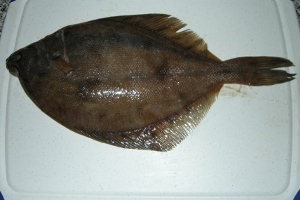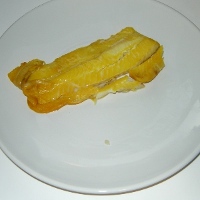Buying and cooking fresh and frozen sustainable fish
I’ve already written a post about how easy it is to buy sustainable tinned fish from a supermarket, but what about fresh and frozen fish.
Until recently there seamed to be little choice at the supermarket except for frozen pollock (alternative haddock) or frozen coley (alternative to cod), but with help to the publicity from The End of the Line, Hugh’s Fish Fight the supermarkets are stocking a wider range of sustainable fish.
The following are based on purchases from my local Sainsbury’s supermarket, Tescos Extra store and Morrisons supermarket in Redditch. The Sainsbury’s and Morrisons stores are relatively small, but the Tesco’s is a very large two floor extra store.
The best supermarket for range of fresh fish on sale is Morrisons, which is sadly let down by having the worst in sustainable tinned fish. With Morissons not having any pole and line caught tinned tuna, compared to a small selection and Tesco’s and all the Sainsbury’s brand.
Frozen Fish
Sustainable fish has been available in the freezer section for some time. Mainly because it’s cheaper and so popular in prepared fish, but it’s a great way to eat fish without eating the rest of the remaining cod stocks. These frozen fish choices are generally available at most supermarkets.
Coley and Pollock, alternatives to Cod and Haddock
I’ve been buying pollock and coley for years. Pollock is often found in the cheaper “white fish” products. It’s slightly less white, but is just as tasty as Haddock. The same can be said comparing Coley with cod. I’ve used both these cheaper and sustainable alternatives in curry’s and fish pies etc.
Basa
Basa is a fish I’ve also started buying fairly recently (but again before the publicity from The End of the Line and Fish Fight). It’s available as a breaded oven cook fish and is a great healthy alternative to battered fish.
Basa (also known as Vietnamese River Cobbler) is a farmed fresh water fish.
There is a downside to the sustainability of Basa which is that the fish used in the feed may not be from a sustainable source. The fish is however an omnivore and so does not consume as high a ratio of fish as is used in some other farmed fish (eg. Salmon).
Fresh Counter
The choice of fish is getting better at supermarkets. I was impressed with the range at Morrisons including the fresh fish counter and the pre-packed fresh fish. They have improved their labelling recently, including information on the origin and fishing method, although you do need quite good eyesight to see it, this is much better than some other places.
Note that the quantity and variety of fresh fish can change on a regular basis, so you may have to keep an eye out for what’s available.
Here are some of the fresh fish from some supermarkets.
Mackerel

Mackerel is available at most supermarkets and is one of the best sustainable fish as it’s fast growing pelagic fish in plentiful supply around the UK. It’s easy to prepare and cook. It is usually whole, but is available as fillets (head, tail and most bones removed) from Morrisons.
It is delicious freshly grilled and served with salad and a nice glass of white wine.
Also look out for Mackerel in a Bap (MackBap) at some fish & chip shops supporting the fight for sustainable fish.
Dab
Dab is a flatfish which is on the recommended eat more list. The reason for this is that until recently (ie. before Fish Fight) the fish had little commercial value and so was discarded when caught. Choosing Dab over other fish can help to reduce the demand for the other fish (eg. Turbot).

Dab is available at Sainsbury’s (whole) or Morrison’s (prepared). It’s easy to grill or oven cook (good non stick tray recommended). I recently served to my family, who mainly asked for the head and tail to be removed first, but it’s very easy to scrape the fish from the bone on the table.
I’ve also made the Dap in a Bap (River Cottage Community Recipe). It was quite easy to remove the fillets with skin on from the bone using a sharp knife. Although I think I may have wasted a bit more fish than someone with a bit more practice may.
Smoked white fish
Cod is the smoked fish to avoid due to the collapse of many of the cod stocks, but there are still other alternatives to haddock which is the next obvious choice.

I recently had some smoked Hoki from Morrisons which was from an MSC certified fishery. I particularly enjoyed the Hoki which had a good texture and strong smoke flavour, although my daughter found the smoke flavour a little too strong.
Note that some Hoki fisheries are not considered to be sustainable – only buy Hoki when it carries the MSC or other sustainable guarantee.
My daughter however really enjoyed the smoked River Cobbler from Tesco’s (also available under the label of smoked Basa at Morrisons).
Note that although River Cobbler / Basa is a farmed fresh water fish, the fish used in the feed may not be from a sustainable source.
As smoked white fish is sold as boneless fillets it is very easy to prepare by poaching or even cooking in the microwave.
Kippers
Most supermarkets sell fresh kippers (either on the fish counter or in the fridge). You won’t find kippers directly on the MCS fishonline web site as you instead need to search under the name of the fish which is herring.
Whilst grilled kippers do taste very nice the bones can be hard to pick out and so are less popular in my house, particularly with my children.
Cornish Sardines
Although it is possible to find tinned sardines from Portugal from MSC certified fisheries the sardines caught around Cornwall are generally considered to be more sustainable (see FishOnline Advanced Search) and are available from Sainsbury’s as either fresh or prepared with a dressing.
Although easy to cook and taste delicious these also come with lots of bones. Whilst it is normally possible to eat the bones or pick out whilst eating this is not that pleasant.
Crab
Tesco and Morrisons both sell cooked crab either dressed or undressed (partially prepared at Morrisons). I recently bought a crab from Tesco’s which was very overcooked and watery, but that may have just been a one off.
When buying crab look to ensure that these are above the minimum recommended size of 130-140mm to avoid eating those that have not yet had chance to reproduce.
Mussels
Mussels are usually farmed in a sustainable way (particularly rope grown) and are available live at most supermarkets. They do take some preparation (first remove the beards), but it’s easy enough even if it does take a little while. Once prepared they are easily cooked in only a few minutes. Freshly cooked mussels are so much nicer than buying previously frozen mussels.
Conclusion
There is an increasing amount of sustainable fresh fish at our local supermarkets, which is particularly good for people like me that enjoy fresh fish, but are too far from a local fishmonger.
I’m not an expert, an environmentalist or a fisherman. I am a consumer that enjoys eating fish, but I believe that if we want our future generations to be able to continue eating fish and enjoying our seas then we need to think more carefully about the fish we eat.
Different sources of information may contradict or place a different emphasis depending upon their bias (eg. err on the side of caution vs. avoiding over-reacting) or information available. The important thing is that if more people had a little awareness before buying fish then it could make a real difference to the state of our seas.
My own information on sustainable fish and fish to avoid comes from various sources which I’ve listed below. Don’t just take my word on it; if you care about our seas and the fish you eat then I suggest you use these on a regular basis to make informed choices about which fish to buy.
- The End of the Line (DVD and Book)
- The River Cottage Fish Book (Book review)
- Hugh’s Fish Fight
- MCS – FishOnline (Fish search – good information on each fish)
- Marine Stewardship Council (MSC)
- Good Fish Guide (updated Jan 2011)
Also see my earlier post on Shopping for Sustainable fish (Tinned).
